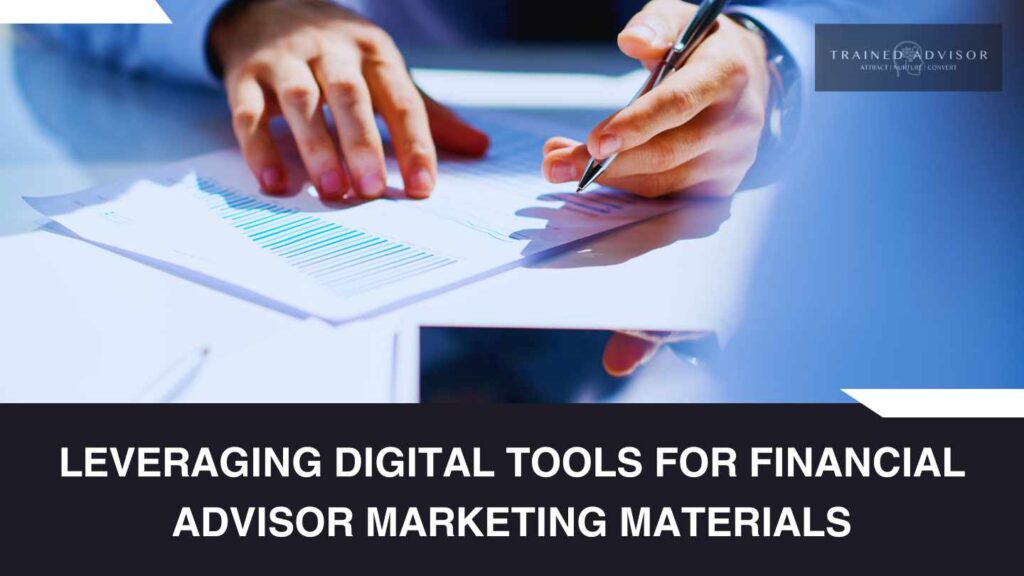Introduction
In today’s digital age, the landscape of financial advising is rapidly evolving. Gone are the days when traditional marketing techniques were enough to attract new clients and grow your business.
Digital marketing has emerged as a vital tool for financial advisors, offering unprecedented opportunities to reach, engage, and convert potential clients.
Why should you, as a financial advisor, invest time and resources into digital marketing?
Here are compelling reasons:
| Wider Reach | Digital marketing breaks geographical barriers, allowing you to reach potential clients nationwide or even globally. |
| Cost-Effective | Compared to traditional marketing methods, digital campaigns can be more affordable and yield a higher ROI. |
| Targeted Campaigns | With digital marketing, you can tailor your efforts to reach specific demographics, interests, and financial goals. |
| Measurable Results | Digital marketing provides real-time data to measure the success of your campaigns, enabling data-driven decisions. |
| Enhanced Client Engagement | Engage with clients and prospects through various channels like social media, email, and your website. |
By the end of this article, you will have a comprehensive understanding of digital marketing strategies that are essential for financial advisors aiming to increase their brand awareness, attract quality leads, and ultimately, expand their client base. Let’s dive in.
Understanding the Basics of Digital Marketing for Financial Advisors
Digital marketing encompasses a broad range of marketing tactics and technologies used to reach consumers online. For financial advisors, it’s a powerful means to build brand awareness, engage with potential clients, and drive conversions. Here’s a breakdown of the core components:
Digital Marketing Channels
SEO (Search Engine Optimization)
Content Marketing
Social Media Marketing
Email Marketing
Pay-Per-Click (PPC) Ads
Why Digital Marketing Matters?
- Building Online Presence: An optimized website and active social media profiles increase your visibility online.
- Establishing Authority: Sharing insightful content positions you as an expert in your field.
- Engaging with Your Audience: Digital channels offer direct ways to communicate with potential and existing clients, building stronger relationships.
- Generating Leads: Effective digital marketing strategies drive traffic to your website and convert visitors into leads.
The Key Strategies for Success
- Identify Your Target Audience: Know who your ideal clients are, their needs, and where they spend their time online.
- Optimize for Search Engines: Use relevant keywords, meta descriptions, and create quality content to improve your site’s ranking on search engines.
- Create Value-Driven Content: Address your audience’s pain points and questions through blog posts, videos, and infographics.
- Leverage Social Proof: Testimonials and case studies from satisfied clients build trust with prospects.
- Track and Measure Results: Use analytics to understand what’s working and adjust your strategy accordingly.

Setting Up Your Digital Presence
Creating a Professional Website
- Design and Usability: A clean, modern design with intuitive navigation makes your site welcoming and easy to use. Ensure it’s mobile-responsive, as many users will visit your site from their phones or tablets.
- Content: Include clear descriptions of your services, your value proposition, and why clients should choose you over competitors. Highlight your expertise with educational content, such as articles or guides on financial planning.
- SEO: Optimize your website with relevant keywords, meta titles, and descriptions to improve visibility in search engine results. Ensure fast loading times and secure browsing (HTTPS) to boost SEO rankings.
SEO Optimization for Maximum Visibility
- Use Industry Jargon Appropriately: Incorporate financial and investment terminology that resonates with advisors, but avoid over-complication.
- Address Industry-Specific Challenges: Tailor your message to reflect solutions to common issues faced by financial advisors, such as regulatory compliance or client retention.
Choosing the Right Marketing Channels
Digital Marketing Strategies
1. SEO (Search Engine Optimization)
2. Email Marketing
3. Social Media Marketing
Traditional Marketing Techniques That Still Work
- Networking Events and Conferences: Attend industry events to meet financial advisors face-to-face, understand their needs, and introduce your solutions.
- Print Media: Industry magazines and newsletters can be excellent vehicles for reaching financial advisors who value traditional forms of media.
- Direct Mail: A well-crafted, personalized direct mail piece can stand out and make a memorable impression in an era dominated by digital communications.
The Power of Referral Marketing
- Encourage Client Referrals: Satisfied clients are often willing to refer others. Make it easy for them to do so and consider offering incentives.
- Partner with Industry Associations: Collaborating with associations and groups within the financial industry can help amplify your reach and lend credibility to your offerings.
- Leverage Professional Introductions: Introductions from mutual professional contacts can open doors that might otherwise remain closed.
Content Marketing: Engaging Financial Advisors
Blogging: Establishing Thought Leadership
- Cover Topics That Matter: Write about issues, trends, and challenges relevant to financial advisors. Focus on providing solutions or new perspectives that can aid them in their practice.
- Showcase Expertise: Use your blog to demonstrate your knowledge and expertise in areas that matter to financial advisors. This helps build credibility and trust.
- Encourage Engagement: End posts with a call-to-action that encourages readers to engage—whether through comments, sharing the post, or contacting you for more information.

Webinars and Online Workshops
- Address Current Issues: Host webinars on timely topics that are impacting the financial advisory world. This positions your brand as current and in-touch.
- Offer Practical Solutions: Use these sessions to offer practical advice and actionable strategies that advisors can apply in their practices.
- Facilitate Q&A Sessions: Include a Q&A segment to address specific concerns and foster a more personal connection with your audience.





